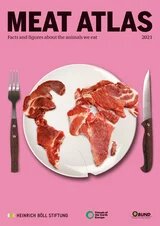Atlas
Meat Atlas 2021
Facts and figures about the animals we eat
Read the web dossier | Deutsche Version | Wersja polska | En español | Magyar változat
There is hardly any other food that pollutes our environment and the climate as badly as meat. However, no government in the world currently has a concept of how meat consumption and production can be significantly reduced. But if the sector continues to grow as it has up to now, almost 360 million tons of meat will be produced and consumed worldwide in 2030. With ecological effects that are hard to imagine.
Product details
Date of Publication
September 2021
Publisher
Heinrich-Böll-Stiftung, Friends of the Earth Europe & BUND
Number of Pages
76
Licence
Language of publication
English
Table of contents
- Meat Atlas 2021: Introduction
- 12 brief lessons about meat and the world
- Consumption: everyday food and luxury good
- World trade: in lorries and ships
- Mercosur: trading away the environment
- Production: problem foods and their producers
- Abattoirs: chopping but not changing
- Meat waste: a lot less than the whole fog
- Land conflicts: cutting down forests, carving up pastures
- Companies: dominating the market from farm to display case
- Finance: big bucks for big firms
- Gender and poverty: yet more unpaid work
- Feed: soy, forest, and savanna
- Climate: a lighter hoofprint
- Pesticides: banned by Brussels, allowed in the Amazon
- Water: thirsty animals, thirsty crops
- Fertilizers: too much of a good thing
- Rewetting: give peat a chance
- Antibiotics: useless medicines
- Pandemics: dangerous contacts
- Pastoralism: bounty from a barren land
- Pastoralism in India: rangeland, not wasteland
- Active state: the political economy of transforming the meat system
- The European Union: common livestock policy
- Label: three stars for a better life
- EU strategies: a good start, but could try harder
- Lab meat: cellstock vs livestock
- Insects as food: snacking on silkworms, lunching on locusts
- Meat substitutes: a new sector emerges
- Activism: pressure from below
- Survey on youth: changing habits
